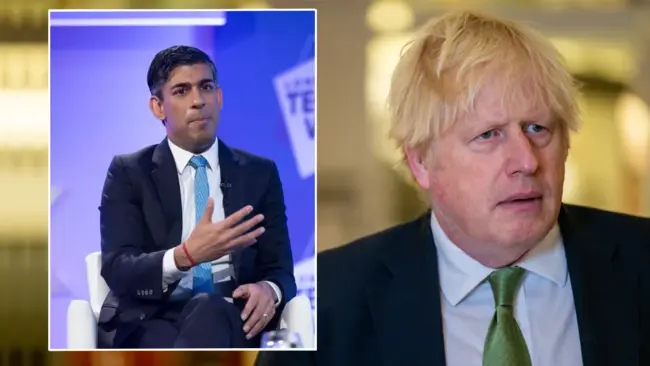Boris Johnson has accused Rishi Sunak of 'talking ’ after the Prime Minister said he urged him to overrule the screening committee for House of Lords appointments.

'Rishi Sunak is talking ', he remarked. To honour these peerages, it was not required to override Holac - simply asking them to renew their vetting was sufficient.
What happened?
Yesterday, exclusively speaking at London Tech Week, Rishi accused Boris of asking him to ‘do something I wasn’t prepared to do’.
Appearing at the London Tech Week conference for his first public remarks since Boris quit as an MP, Mr Sunak said: ‘Boris Johnson asked me to do something that I wasn’t prepared to do because I didn’t think it was right.’
‘That was to either overrule the Holac committee or to make promises to people.
‘Now, I wasn’t prepared to do that. I didn’t think it was right and if people don’t like that, then tough.’
‘When I got this job I said I was going to do things differently because I wanted to change politics and that’s what I’m doing.
‘And I’m also keen to make sure that we change how our country works and that’s what I’m here talking about today: making sure that we can grow our economy, that we can maintain our leadership in the innovative industries of the future.’
What was Johnson pushing for?
Johnson nominated at least 16 aides, colleagues, and friends for peerages in an attempt to thank people who assisted him in Downing Street.
He was within his rights to do so, and previous outgoing prime leaders have used the resignation honours list to reward people who stayed with them until the final end.
For months, it had been widely reported that four sitting Conservative MPs would be rewarded: the Scottish secretary, Alister Jack; former Cop26 president Alok Sharma; Nigel Adams, a backroom operator with a roving Cabinet Office brief; and ex-culture secretary Nadine Dorries.
But there was a curious delay to the list being approved.
Why the hold-up?
The lengthy nature of Johnson's honours list was first blamed for the delay. The peerages were handled alongside other titles Johnson sought to confer on close friends and confidantes.
It took time for the government to tone down Johnson's original controversial ideas, which reportedly included the loss of his father, Stanley's, knighthood.
Meanwhile, the House of Lords Appointments Commission began scrutinising the names of those whom Johnson wished to bestow peerages and the lifetime legislative rights that go with them.
The commission ruled that it would not be possible for the four Tory MPs nominated to hold on to their seats and move to parliament’s upper house at the next election. They either had to commit to standing down from the Commons and joining the Lords within six months, or face being left off the list.
How did Johnson try to break the deadlock?
Johnson lobbied for a rare face-to-face meeting with Prime Minister Rishi Sunak to discuss peerages, which was granted on June 2.
Wary of the coming conclusions of a Commons privileges committee inquiry into charges he deceived MPs about 'Partygate', which could have resulted in a byelection he was certain to lose, he encouraged Sunak to move swiftly.
There were only three persons in the room, and stories about what happened differ.
It appears that Johnson came away from the meeting believing he had been given assurances his list of proposed peerages would be approved.
But Downing Street insiders have suggested Sunak gave no such cast iron guarantee, and instead merely signalled his intention to simply sign off on the approved list that came back from the appointments commission.
Why did the final list trigger such chaos?
The commission approved only eight peerages, and on Friday, the names of those cleared to join the House of Lords were made public.
No 10 took the uncommon step of declassifying the list received from the commission in February. This was done to demonstrate that Sunak had not eliminated any names and that any exclusions were not attributed to him.
In addition to the seven announced names, there was an eighth name, although it was redacted. No 10 stated that the individual withdrew due to personal reasons.







Comments ( 0 )